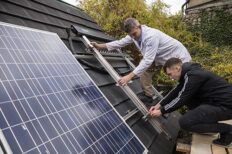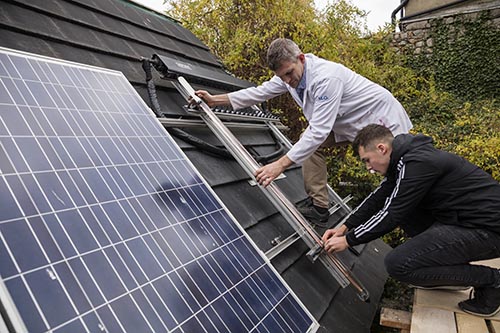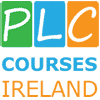Course description
Duration:
This is a Full time one year course, which runs from September to May.
Overview:
This course is suitable for students who wish to progress to further and higher education courses in the construction industry, and also those who wish to prepare for an apprenticeship in a construction related trade such as Carpentry and Joinery, Electrical, Bricklaying, Plastering or Plumbing. In addition to the foundation skills of the building trades, students are also introduced to the fundamentals of green building technology with an emphasis on renewable energy, insulation, conservation and sustainability. Students will also develop practical skills such as solar/photovoltaic panel installation, retrofitting of domestic buildings, green building technology, energy upgrades and installation of insulation in order to build up their skills. On completion, graduates are eligible to progress to construction, architecture and engineering programmes at Third Level or to progress directly into employment.
Entry Requirements:
One of the following:
- Leaving Certificate (LC Established, LCVP, LCA) or equivalent
- A Full Level 4 QQI Award (or Equivalent)
- For Mature applicants (aged 21 or over) – appropriate experience will be considered in lieu of formal qualifications are welcome. Note: Mature applicants may be entitled to VTOS funding. For details about VTOS, please contact the college.
- For applicants who do not meet the above entry requirements, please contact DFEi
- Applicants whose first language is not English require level B2 competency on the CEFR language framework. Applicants may be required to undergo English language testing to establish their language competency.
Course Modules:
- Wood Fabrication
- Building Services
- Building Construction
- Computer Aided Draughting (2D)
- Safety and Health at Work
- Mathematics (Optional) for those students requiring Mathematics for progression through the CAO for Higher Certificate and Degree courses.
- Communications
- Work Experience
Certification:
- Level 5 Award Construction Technology (5M5010)
- Safe Pass Certificate. A Safe Pass Certificate is required for anyone entering a construction site to work. (Additional Fee Applies). Check with course teacher for further details once on the course.
Special Features:
Students will take part in a number of field trips throughout their course of study, to various low energy dwellings, to experience first-hand, the application of renewable energy technologies. An educational workshop for example in Cloughjordan Eco Village will provide students with an opportunity to examine how communities are developing sustainable building strategies.
Specialist Resources include:
- Solar and Photovoltaic Panels
- Water Heat Exchangers
- Exchange Ventilation Unit
- Underfloor Heating System
- Insulation System
Free Autodesk Software Subscription for all students on this course to facilitate assessment work.
All DFEi students are provided with an M365 account, which gives them access to the tools and resources needed to deliver assessment work while attending their course. M365 Apps include Word, PowerPoint, Excel, outlook and OneDrive.
Work Experience:
Students will be required to undertake a period work placement in an organisation connected to their vocational area during the academic year. Students are required to source their own work placement but will be assisted in this by the work experience teacher. The work placement is usually for a period of 10 days or a minimum of 60 hours. Students usually find the work experience element of the course to be invaluable and should bear in mind that a successful work placement can sometimes lead to further opportunities.
Additional Information:
Assessment:
Assessment techniques will be used to assess the knowledge and skills that students will have achieved on successful completion of modules:
- Student Record
- Collection of Work
- Assignments
- Examination (Written)
- Project
- Skills Demonstration
A full major award is granted on passing the relevant eight components. On successful completion of each component, you will be awarded a pass, a merit or a distinction grade. See www.qqi.ie for more details
Progression Opportunities:
DFEi: Graduates may progress to the Level 6 QQI Advanced Certificate in Architectural Technology and Design at DFEi.
Elsewhere: Graduates are eligible to apply through the CAO and/or the Higher Education Links Scheme for entry to year one of a range of higher certificate and degree programmes, at Universities, Institutes of Technology and Technological Universities using their full QQI Level 5 major award. Places are not guaranteed in these Institutes and are subject to students meeting certain criteria. It is the students’ responsibility to consult with the relevant HEI for information on the admissions process and any specific entry requirements. Students may also refer to the individual HEI prospectus or may also refer to the QQI FET section of the CAO website. www.cao.ie
Examples of CAO progression opportunities are listed below.
Progression Examples:
BSc Sustainable Timber Technology (TU838)
BSc Construction Management (TU833)
BSc Architectural Technology (TU831)
BEng Civil Engineering (TU704)
BEng Building Engineering (TU703)
BSc Product Design (TU811)
BSc Electrical Services and Energy Management (TU802)
BSc Quantity Surveying and Construction Economics (TU837)
BSc Planning and Environmental Management (TU838)
Technological University Dublin – www.tudubline.ie
BEng Engineering (LC251)
BSc Civil Engineering Management (LC252)
BSc Construction Management (LC241)
BSc Property Valuation and Management (LC242)
Limerick Institute of Technology – www.lit.ie
BSc Construction Management (CW417)
BSc (Hons) Construction Management (CW438)
BEng Civil Engineering (CW478)
Institute of Technology Carlow – ww.itcarlow.ie
BSc Building Surveying (DK730)
BSc Architectural Technology (DK731)
BSc Construction Management (DK732)
BSc (Hons) Building Surveying (DK830)
BSc (Hons) Architectural Technology (DK831)
BSc (Hons) Construction Management (DK832)
Dundalk Institute of Technology – www.dkit.ie
BSc Construction Management and Engineering (WD025)
BSc Architectural Technology (WD094)
Bachelor of Architecture (WD144)
Waterford Institute of Technology – www.wit.ie
Career Paths:
Graduates can obtain employment in both the construction and the renewable energy fields completing roles in wind energy, solar power and energy efficiency





 Distance Learning and Online Courses are offered in a number of different formats, these include correspondence courses (by post), online via computer or a combination of online and classroom instruction (blended learning).. View
Distance Learning and Online Courses are offered in a number of different formats, these include correspondence courses (by post), online via computer or a combination of online and classroom instruction (blended learning).. View  Further Education and PLCs (Post Leaving Cert Courses) have become a popular alternative to the CAO system here in Ireland. PLC Courses are validated by QQI (Quality & Qualifications Ireland) at levels 5 & 6 of the NFQ.. View
Further Education and PLCs (Post Leaving Cert Courses) have become a popular alternative to the CAO system here in Ireland. PLC Courses are validated by QQI (Quality & Qualifications Ireland) at levels 5 & 6 of the NFQ.. View  Continuous Professional Development (CPD) helps to keep job skills and professional knowledge up to date and ensures the standard of registrations & qualifications are maintained.. View
Continuous Professional Development (CPD) helps to keep job skills and professional knowledge up to date and ensures the standard of registrations & qualifications are maintained.. View  Evening courses and part time learning options are a great way to enhance a CV, to socialise and make friends, as well as learn something completely new. There are an abundance of night courses and evening classes available.. View
Evening courses and part time learning options are a great way to enhance a CV, to socialise and make friends, as well as learn something completely new. There are an abundance of night courses and evening classes available.. View